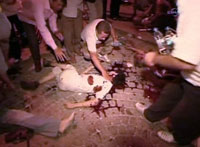Turkey suffers from deadliest terrorist act in years
Two bombs exploded minutes apart in a packed Istanbul square Sunday night, killing 16 and injuring more than 150 in the deadliest attack against civilians in Turkey in almost five years.

The city's governor called it a "terror attack" but officials did not blame any specific group and no one immediately claimed responsibility. CNN-Turk television, citing security sources, said police suspect Kurdish rebels may be behind it because intelligence reports had suggested the rebels were planning a bombing campaign in Turkish cities.
"There is no doubt that this is a terror attack," Gov. Muammer Guler told reporters.
The first bomb went off in the residential neighborhood of Gungoren in a busy square closed to traffic where people congregate at night, witnesses said. A number of people had rushed over to see what happened and help the victims when a second, more powerful blast hit close by about 10 minutes after the first. Many of the casualties were from the second explosion, witnesses said.
"The fact that there was a crowd in the area has increased the number of casualties," the governor said. The governor's office said 154 people were injured. Of those, 15 were in critical condition, a government official at the scene said.
An Associated Press reporter who arrived to the scene shortly after the explosions saw at least 12 people lying on the ground. Broken glass, clothing, shop mannequins and other debris were strewn on the ground and bomb squads in white overalls were inspecting the scene.
Many of the injured waited for medical treatment, their faces and bodies covered with blood. Several people who appeared seriously wounded were wrapped in blankets and carried to ambulances waiting near the site of the blasts.
"The first explosion was in a telephone booth," said Huseyin Senturk, who owns a shoe shop yards away from where the blasts occurred. "The second explosion was some 40 meters (yards) away."
"The first explosion was not very strong," Senturk added. "Several people came to see what was going on. That's when the second explosion occurred and it injured many onlookers."
The second explosion could be heard a mile away, witnesses said. The governor said the bombs were planted in trash cans.
The attack was the country's worst since November 20, 2003 when al-Qaida linked suicide bombings struck the British consulate and a British bank, killing at least 30 people. Five days earlier, suicide truck bombs attacked two Istanbul synagogues, killing 27.
Prime Minister Recep Tayyip Erdogan and President Abdullah Gul strongly condemned Sunday's bombings.
"No goals can be achieved with violence, killing innocent people and terrorism," Gul said in a written statement. "These attacks show how inhumane and miserable the instigators are."
Police were investigating who was behind the blasts.
"We know it is a terrorist attack, but which organization is responsible _ we don't yet have that information," Deputy Prime Minister Hayati Yazici told journalists at the scene of the attacks.
Kurdish, leftist and Islamic militants are active in Istanbul and have carried out past bombings in the city.
On July 9, gunmen believed to be inspired by al-Qaida opened fire on police guarding the U.S. consulate in Istanbul, killing three officers. Three attackers also died in a shootout with police.
Kurdish rebels belonging to the Kurdistan Workers' Party, or PKK, have been fighting for self-rule in southeastern Turkey since 1984. The violence has killed tens of thousands of people since then.
Turkey has conducted frequent air raids on suspected rebel positions in northern Iraq, including one earlier Sunday. Earlier this year, it launched a weeklong ground offensive against the rebels.
Although most of the fighting in concentrated in rural areas of southeastern Turkey, the rebels occasionally launch bombing campaigns in Turkish cities and tourist resorts.
Sunday's attack also came a day ahead of the scheduled start of a top court's deliberations on whether to ban the Islamic-oriented ruling party because of its alleged attempts to undermine secularism. The legal case has raised political tensions in Turkey, where the government is locked in a power struggle with elements of the secular establishment backed by the military and judiciary. But it was not clear whether the bombings were linked to the case.
Subscribe to Pravda.Ru Telegram channel, Facebook, RSS!




